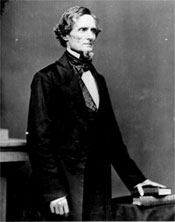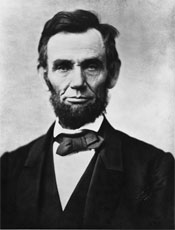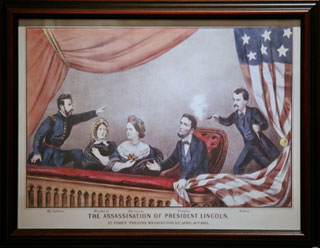
Source: Jefferson Davis, Wikimedia

Source: Jefferson Davis, Wikimedia

Source: Abraham Lincoln Head on Shoulders Portrait, Wikimedia
The Civil War was a time for great speeches. Part of Abraham Lincoln's legend is the fact that he provided three of the most memorable addresses in U.S. history—his two inaugural addresses, and of course his brief speech at Gettysburg. By contrast, one of the major historical criticisms of his Confederate counterpart, Jefferson Davis, is that he rarely was able to rally the South with a dramatic speech. Davis was a sincere defender of the Confederate cause, but his rhetoric did not match his dedication.
In this resource, you will compare the inaugural addresses of Lincoln and Davis and take a further look at Lincoln's second inaugural.
The following are two excerpts from the presidents' inaugural speeches of 1861. Read each excerpt and answer the questions that follow in your notes.
![]()
The two excerpts demonstrate Lincoln's ability to make a speech and express heartfelt ideas of a situation in simple, yet powerful ways. Davis believes in the Southern cause, and that the Confederacy represents the original intent of the U.S. system of government but lacks the eloquence. Ironically, Davis will find that passion, but only in the final months of the war when it is too late.
While the Gettysburg Address is Lincoln's most well-remembered speech, an increasing number of historians—and Lincoln himself—thought his finest hour was his second inaugural address, delivered approximately a month before the conclusion of the war.
In this next activity, you will examine a series of excerpts from the speech.
![]()

Source: The Assassination of President Lincoln,
Currier & Ives, Library of Congress
One of the great tragedies of the Civil War is that the country never found out if Abraham Lincoln could have delivered a peace governed by the principles of "with malice towards none, with charity for all." The period of Reconstruction that followed the Civil War did not find a peace that successfully bound up the nation's wounds.
The peace the South would receive ultimately was much harsher because John Wilkes Booth shot the man best suited to unite the country and who understood from the very beginning that "we are not enemies but friends, we must not be enemies."
→ Reflection: If you were President of the United States and just won a four-year bloody war that claimed 700,000 of your own citizens, could you ask for a peace "with malice toward none, with charity for all?" Would you have wanted to punish the enemy? Answer in your notes.